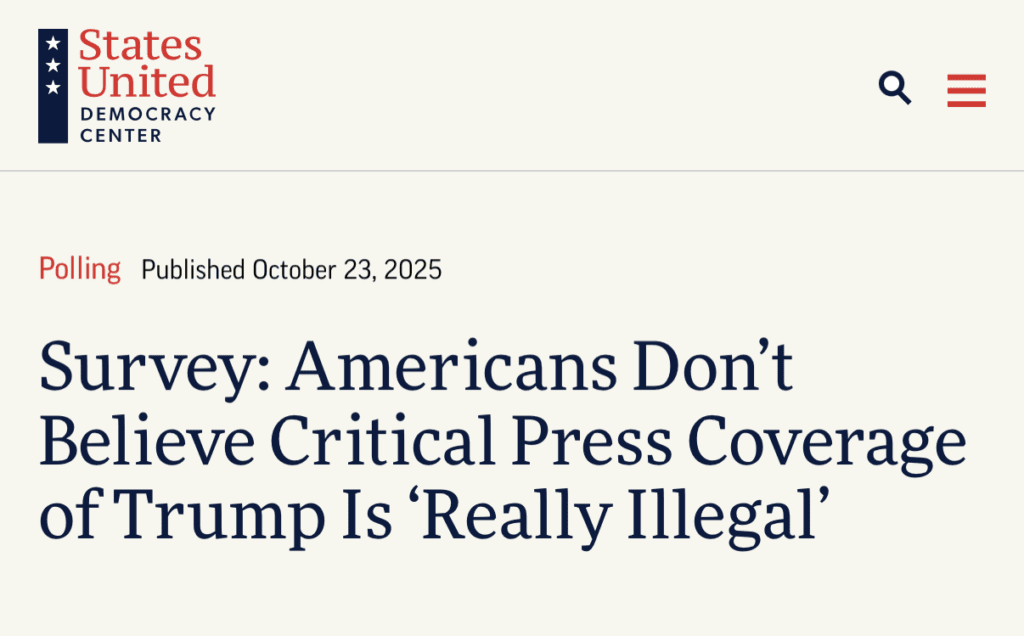Principles, Values, Traditions
Plus: States feel the impact of the government shutdown. 🗳️
For many former military leaders, veterans, and military families, the Trump administration’s recent federalization and deployment of National Guard troops raise serious concerns about troop morale, Americans’ trust in the military, recruitment effort, and the rule of law.
Military voices are critical to understanding the consequences of the administration’s latest actions, as they represent one of the most trusted institutions in our democracy.
Retired senior military officers have shared their perspectives in court cases challenging President Trump’s deployments in California and Oregon, while also joining state leaders to speak to the public as federalization and deployment issues evolved.
Seeing the need to elevate the important voices of veterans and military families, States United is working closely with our partners at Vet Voice Foundation to ensure they’re heard in key court cases and in the public discourse.
You can read more about their concerns and States United’s work in our latest online resource.
This Week in Democracy
- A federal judge in Chicago indefinitely extended an order blocking the Trump administration from deploying the National Guard in Illinois. Last week, the administration asked the U.S. Supreme Court to lift the order and allow the deployment.
Officials from 23 states and the District of Columbia filed a brief urging the Supreme Court to maintain the federal judge’s order blocking the deployment. Ordering troops to patrol Chicago “infringes on Illinois’s sovereignty and its ability to enforce state laws,” they wrote.
➡️ EXPLORE: Background on lawsuits challenging the deployments
- Lawyers for former FBI Director James Comey filed two motions to dismiss the criminal charges against him. One accuses the Trump administration of a “vindictive” prosecution. The other argues that interim U.S. Attorney Lindsey Halligan, who brought the case, was illegally appointed to her position and had no authority to bring the charges.
Meanwhile, New York Attorney General Letitia James pleaded not guilty in her federal criminal case, which was also brought by Halligan. James’s lawyers, like Comey’s, are planning to argue that the charges should be dismissed because Halligan was unlawfully appointed.
➡️ READ: Sharing the Facts About Misusing Federal Law Enforcement for Political Retaliation
- As the federal government shutdown continues, states are warning of its consequences. Among the many impacts, dozens of states—including California, Texas, New York, and Florida—issued notices that food stamps could be delayed.
California Gov. Gavin Newsom said that he would deploy his state’s National Guard to support food banks, along with expediting $80 million in state funding for food banks to make up for the loss of federal funding.
- Seven universities declined to sign agreements with the Trump administration that would give them preferential access to federal funding in exchange for aligning their policies more closely with the administration. Federal officials initially made the offers to nine universities, but later opened up the offer to any that were willing to sign.
The Justice Department announced that it had reached a deal with the University of Virginia that paused federal investigations into the school’s admissions policies. It’s the first time a public university has reached a deal with the Trump administration.
➡️ READ: Sharing the Facts About the Impact of Targeting Higher Education
- Trump is pushing for the Justice Department to pay him $230 million in damages for the now-dismissed federal investigations into him, according to reports. Experts say that the potential payment raises major ethical conflicts. Richard Painter, former White House chief ethics lawyer, said that it could violate the Constitution.
State of the States
In California, San Franciso Mayor Daniel Lurie announced that Trump called off plans to deploy federal agents to the city. Lurie said in a statement that city officials “would welcome continued partnerships” with federal agencies for drug enforcement, but that deployments like those in other cities would be unhelpful.
In North Carolina, the state legislature approved new congressional district lines that will give Republicans an advantage in the first district—currently represented by Democratic U.S. Rep. Don Davis—in next year’s midterm elections. Because Gov. Josh Stein cannot veto the measure, the new districts are now law.
North Carolina is the third state to redraw its districts this year at the president’s request, joining Texas and Missouri. Each did so outside of the normal once-a-decade process. All three are facing lawsuits.
State lawmakers in Virginia announced that they, too, were starting the process of redrawing their state’s districts. If passed, voters would have to approve the plan next year.
In Oregon, a federal appeals court lifted a lower court’s order that stopped the Trump administration from claiming control of the Oregon National Guard.
But troops have not yet deployed to Portland, despite Trump’s orders last month. A lower court judge previously issued a separate order blocking any deployments in Oregon. Following the appeals court’s ruling, the administration asked it to dissolve that order.
In Texas, Secretary of State Jane Nelson announced that her office had used a federal data system to identify potential noncitizens on the state’s voter registration list. But experts say that the system—known as the Systematic Alien Verification for Entitlements, or SAVE—is not designed to be used for election purposes and, based on what is currently known about it, is an unreliable way to verify citizenship.
Nelson indicated that she would notify counties about the findings, and local election officials would be tasked with investigating further to confirm voters’ eligibility. Local officials are in charge of maintaining their voter rolls and routinely do so in accordance with law. Conspiracy theorists have continuously attempted to use false narratives about noncitizens voting to cast doubt on American elections, but data shows that this is exceedingly rare.
Recommended Reading
A new poll released this week by States United shows that Americans broadly disagree with President Trump’s belief that critical press coverage of him is illegal.
